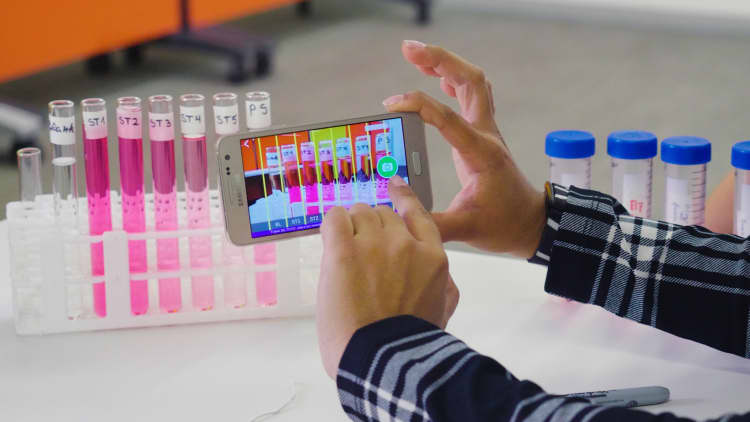
Komal Dadlani was 24 years-old when she completed her Master's degree in biochemistry from the University of Chile.
She loved science — but would often leave class feeling bored.
"My classes were very theoretical, and they were not as engaging as I would like them to be," she told CNBC's Make It. "Then I would visit schools in Chile, and they did not have labs."
Dadlani's frustration prompted an idea: A start-up that would make learning science more accessible, and fun, for students like her across Latin America, where fewer than 15% of students earn degrees in STEM (science, technology, engineering, or mathematics) fields, according to the National Science Foundation. The premise was to use the sensors and processing power of smartphones and tablets for science experiments.
"You never said page 245 of that textbook changed my life," Dadlani said. "It's normally the experience, the teacher that changes your perception and the way you think."
In 2013, Dadlani co-founded Lab4U with Colombian software engineer Alvaro Peralta. The company teaches basic science principles in physics, chemistry and biology by enabling experiments from an app on a smartphone or tablet.
For example, a phone's camera is used to measure color samples in beakers of water, replacing a traditional colorimeter which can cost up to $500 in a lab or classroom. Lab4U's experiments are designed to use cheap, easy-to-find objects like masking tape, toy cars or springs.
"With very basic materials you can actually run experiments," Dadlani explained.
With an estimated 5 billion smartphones in the world, mobile learning apps like Lab4U, Duolingo or Udemy are reshaping the education landscape. The mobile learning market is expected to reach $70 billion by 2024, according to recent research by Global Industry Analysts.
Lab4U is now used by more than 100,000 students in 20 countries, with pricing starting at $15 per student per semester. Dadlani said she has faced several obstacles over the past six years, from raising funding to testing products with students.
"There was a student that actually threw the phone to my face and said I'm not going to do this," she said.
The company partnered with San Francisco-based social game developer Zynga in 2015 to help improve the app's design. Dadlani said maintaining diversity within the app, for example by showing female characters, is a key goal to help combat what she calls the "STEM-leaking pipeline." Globally, only 30% of researchers in the field of science are women.
"The truth is that we are as good as boys when it comes to science and mathematics and engineering, so we are there to change that," Dadlani said.


